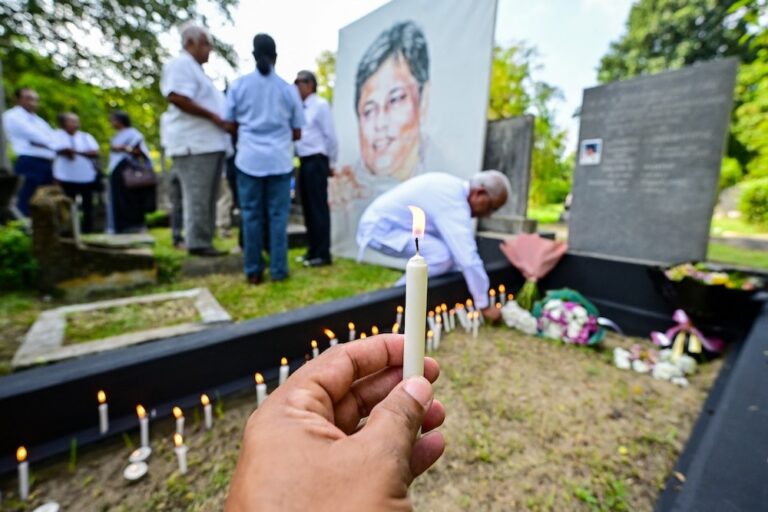(FMM/IFEX) – The following is a 20 August 2008 FMM press release: Indictment of Journalist J. S. Tissainayagam The FMM has learned from reliable media sources that journalist J. S. Tissainayagam, who has been held in detention in the custody of the Terrorist Investigation Department (TID) since 7 March 2008, has finally been indicted in […]
(FMM/IFEX) – The following is a 20 August 2008 FMM press release:
Indictment of Journalist J. S. Tissainayagam
The FMM has learned from reliable media sources that journalist J. S. Tissainayagam, who has been held in detention in the custody of the Terrorist Investigation Department (TID) since 7 March 2008, has finally been indicted in the High Court, which has issued notice of the ruling.
While the FMM has not so far seen a copy of the indictment, reliable sources suggest that it contains the following charges against Mr. Tissainayagam, viz. (1) offences under the Prevention of Terrorism Act (PTA) in respect of the printing, publishing, and distribution of the magazine known as the “North Eastern Monthly” (sic) during the period between 1 June 2006 and 1 June 2007, (2) offences under the PTA in respect of bringing the government into disrepute by the publication of articles in said magazine, and (3) the violation of Emergency Regulations issued under Gazette Extraordinary 1474/5 of December 2006, by aiding and abetting terrorist organisations through the raising of money for said magazine.
The FMM is dismayed that, after five months of detention purportedly for the purposes of investigations by the TID, and in which considerable procedural leeway has been given the authorities by the courts, the Attorney General has only been able to frame charges against Mr. Tissainayagam on such manifestly insubstantial and absurd grounds as these. It appears that the authorities are desperately attempting to manufacture grounds on which to prolong the incarceration of Mr. Tissainayagam using legal provisions that can only be described as oppressive. The FMM notes that at least in respect of the allegation of bringing the government into disrepute, there is no corresponding criminal offence recognised by the law of Sri Lanka, and is therefore at a loss to understand how someone can be charged for the commission of a non-existent offence. These concerns raise several questions of very grave significance for the protection of fundamental human rights in general, and freedom of expression and the independence and integrity of the media in particular.
The PTA has always been widely regarded as a “draconian piece of legislation” that has led to the abuse of power, ethnic discrimination, the suppression of liberty, and that is inconsistent with international standards of human rights protection. FMM also notes that this is the first occasion since it was enacted in 1979 that a journalist has been charged under the PTA, in respect of matters arising directly from the practice of his profession. The PTA not only undermines universal principles of procedural justice and confers inordinate powers in the hands of the executive; it also directly undercuts freedom of expression and the media by allowing content control by the executive on pain of penal sanction.
Local and international human rights groups, including the FMM, have consistently argued from the inception that the Emergency Regulations of December 2006 were wholly inconsistent with fundamental rights guarantees under both the Sri Lankan Constitution and international law. In our statement protesting the promulgation of these regulations in December 2006, we noted that the wide, overbroad language of several of the regulations could allow for the possible criminalisation of a range of democratically legitimate activities of the media and civil society, and curtail free expression and dissent. FMM was clearly of the view that, “Taken together, it is inconceivable that such a broad conferral of powers can be exercised without imminent abuse and violation of fundamental rights, especially in the context of the current challenging security environment” (see FMM Statement of 7 December 2006; see also the contemporaneous press releases by the Centre for Policy Alternatives (CPA) and the International Commission of Jurists (ICJ)). With the indictment of Mr. Tissainayagam on what is factually an extremely weak foundation, our worst fears with regard to the dangers of such authoritarian and unconscionable legislation have been confirmed.
The FMM is of the unequivocal opinion that the legal framework established by the PTA and the Emergency Regulations of December 2006 is inconsistent with international standards governing the balance between legitimate national security considerations and freedom of expression, as reflected in the UN-endorsed Johannesburg Principles. The language of the legislation is imprecise and overbroad, they require no rational nexus or proportionality between the restrictive measures and the harm sought to be averted, they do not provide meaningful means of review and appeal, impose disproportionate penalties, and are grossly discriminatory in operation.
Both these pieces of legislation therefore are, as the charges against Mr. Tissainayagam amply demonstrate, a direct attack on freedom of expression and freedom of the media. It represents nothing less than an attempt, by making an example of Mr. Tissainayagam, at the suppression of alternative viewpoints and dissent, open debate and the contest of ideas central to the democratic way of life. It also represents an attempt to silence media professionals into submission through the use of anti-terrorism legislation.
The FMM urges all Sri Lankans to regard the prosecution of Mr. Tissainayagam on these grounds as a serious threat to democracy and human rights in Sri Lanka, which we disregard at our peril. The FMM also urges the international community to take due note of this cynical abuse of emergency powers, and to make the relevant interventions with the Sri Lankan authorities. The FMM hopes that the judicial process in Sri Lanka will vindicate the confidence we repose in it to do justice with regard to Mr. Tissainayagam, and to safeguard the democratic values that are cherished by all Sri Lankans as their birthright.
Updates the Tissainayagam case: http://ifex.org/20fr/content/view/full/96229


